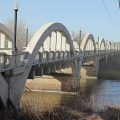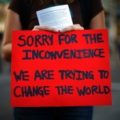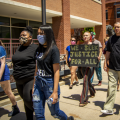
Over the past few months, as people continue to fight for police accountability, affordable health care, and vaccine equity, billions of dollars have started to flow from the Federal government as part of the American Rescue Plan. Some of these investments, like expansions of the Child Tax Credit, which will lift an estimated 4.1 million children, most of them Black and Latinx children, above the poverty line, are a critical step toward fundamentally rewriting our country’s safety net and social contract so that more people have what they need to take care of themselves. We’ve called for this type of investment several times over the past year and, even though many of these investments are temporary and still need to be made permanent, we’re encouraged that Congress is recognizing their critical role in providing a basic level of security.
As Congress’s attention turns to the American Jobs Plan and the American Families Plan, further investments in our public infrastructure could dramatically improve access to broadband, transportation, safe housing, clean water, and quality schools. This could begin to repair our country’s crumbling infrastructure that so many people rely on and that has been systematically disinvested in for decades.
Additionally, $180 billion of the currently-proposed $2 trillion spending package would be used to fund new research efforts. Spent well, this investment could improve our understanding of how the COVID-19 pandemic took hold so strongly in our country and disproportionately impacted BIPOC communities. Unless these investments directly tie to policy and systems change efforts, especially around reducing the unconscionable inequities magnified by the pandemic, this research also has the potential to be disconnected from the real issues facing communities and to deepen the unhealthy and unjust power imbalance between researchers and communities.
Research has the power to define “fact,” “truth”, and "best practice" in ways that determine interventions, allocation of resources, and opportunities for all of us. Over the past three years, I’ve had the incredible opportunity to deepen my understanding of research by participating in the Interdisciplinary Research Leaders national fellowship program funded by the Robert Wood Johnson Foundation. One of the most valuable things I’ve learned in this fellowship is the ways in which research can be used as a tool to support organizing, movement building, and community change efforts. I’ve also learned that if research is not in service to these aims, it can actually deepen inequities by extracting knowledge and labor from BIPOC and low-income communities and generating more wealth and power for traditional research institutions.
At the start of our fellowship, Team Colorado set out to use our strong research skills to support Center for Health Progress’s Nuestra Salud, Nuestra Comunidad Campaign. Over the past year, in the face of pressing community needs around the COVID-19 pandemic, this research agenda had to change. Because of our team’s strong belief that our research must be in service to the community’s priorities, we rapidly shifted all of our research to support COVID-19 outreach efforts through rigorous data analysis and reporting back to the community. Our baseline research data (pre-COVID) and subsequent phone tree data collection efforts (during COVID), coupled with our local organizing strategy, greatly informed and strengthened our advocacy around recent policy changes that support the health of immigrants, including expanding Emergency Medicaid for COVID-19 related hospital care and securing the passage of the Health Insurance Affordability Enterprise.
I’ve learned so much about the power of research to drive social change over these past few years. The responsiveness of our research team was critical, but it is far too uncommon in traditional research settings. Researchers must ensure their studies explicitly challenge the inequities baked into the current systems, and we must demand that public investments like the American Jobs Act hold researchers accountable to that standard.




